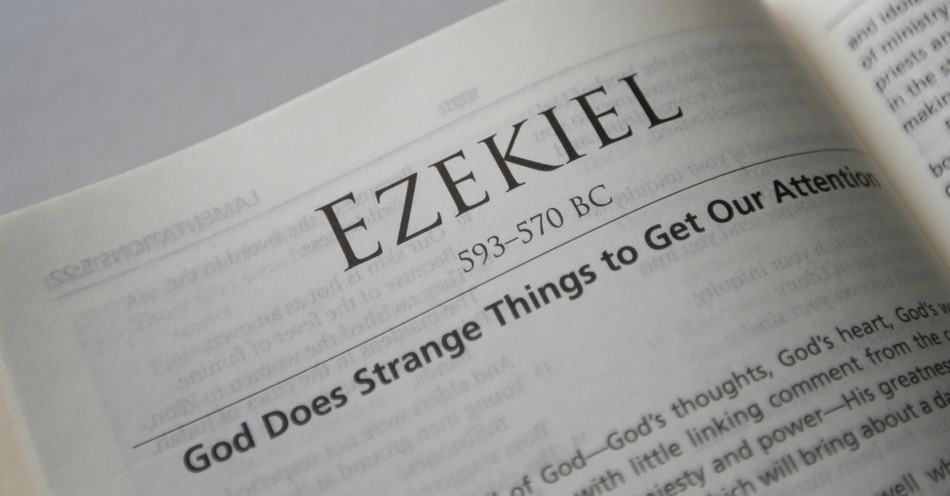The name Ezekiel most likely rings a bell. Perhaps you participated in a church choir that sang a song about Ezekiel and the wheel he saw in a vision from Veggie Tales or about Ezekiel witnessing dry bones coming to life in a desert in the Delta Rhythm Boys version of Dry Bones.
Or perhaps you’ve heard of this Old Testament prophet through the strange visions he encountered or that he saw a rather different version of angels than we’d see in most Christmas ornaments.
No matter what the case, most of us have at least a vague familiarity with this major prophet from the scriptures.
But what do we know beyond this? Are we aware of the historical background that Ezekiel lived in?
Do we know why God had sent Ezekiel so many bizarre visions, along with prophets during the Babylonian exile such as Daniel?
In this article, we’ll dive into Ezekiel’s cultural context, more about the character of Ezekiel (since we often can lack personal details on prophets in the Bible), and why we should know more about him than just all the visions he saw.
Let’s dive in!
The Cultural Context of Ezekiel
Ezekiel lived during one of the most tumultuous times of Israel. The kingdom had split into two and had gone downhill from there.
Assyrians had picked off the Northern kingdom, and the Southern kingdom of Judah had its day of reckoning coming.
The Babylonian Empire had started to sweep the ancient world and made Israel’s kings pay something known as a tribute.
Essentially, Babylon was a bit like a mob boss, and as long as you paid him off, you wouldn’t run into trouble.
Trouble came, however, when Israel’s king decided to cease their tribute.
Instead of trusting in the Lord to deliver them from the Babylonians, Judah placed its faith in the foreign power of Egypt, the very same people who enslaved them years before.
This doesn’t go over well and the Babylonians successfully lay siege to Jerusalem and take most of its inhabitants captive.
By that time, Ezekiel was 25 when he was exiled.
Prior to this, he lived during the successful and godly reign of King Josiah and the not so successful kings who came afterward.
It didn’t help that false prophets ran rampant in Israel at the time and told them they’d be safe from the Babylonians.
Ezekiel’s call to the life of a prophet doesn’t happen until he reaches the age of 30 (Ezekiel 1), much beyond the mid-life point of many people in ancient times (in fact, Ezekiel dies in his 50s.).
We must keep this cultural context in mind because Ezekiel would’ve been in his infant years during Josiah’s reign. He most likely only saw terrible kings on the throne of Israel and then the Babylonian siege.
Sadly, Ezekiel never had the chance to witness the return of the Babylonian captives under the rule of Persia.
For more articles on Ezekiel check out this one and also this one.
The Character of Elijah
The Bible often doesn’t show us the flaws and shortcomings of prophets and doesn’t tend to dive much into their dispositions and personalities. But what do we know about Ezekiel?
Ezekiel started as a priest, which means he came from the tribe of Levi, the tribe specifically consecrated for the priesthood.
Before the exile, he received influence from the famous lamenting prophet Jeremiah.
Although Ezekiel does denounce a number of cities and nations as well as Israel for their sins, he also plays the role of comforter and consoler, a typical balance we see amongst many Old Testament prophets such as Daniel and Jeremiah.
Apart from that, we don’t know much specifically about his character. We know he pursued God fervently, felt despair and hope in terms of Israel’s situation, and knew quite a bit about priestly duties.
What Can We Learn from Ezekiel?
Apart from our lack of knowledge about his personal life we can learn a number of things from this prophet.
First, God can call us to a particular vocation or ministry at any time. Ezekiel’s life was more than halfway over when God sent him prophetic visions.
Perhaps he’d felt a lack of purpose because his priestly duties were no longer needed in Babylon. Still, God uses him and delivers messages full of hope.
Secondly, we can know that God can use even the most difficult of lives to bring glory to him.
Ezekiel had a rough go of things. He likely didn’t have many memories of King Josiah and only witnessed corruption, death, and captivity in his lifetime.
Nevertheless, God prevails in the story. The prophet has something to hope for and look forward to for future generations of Israel.
Photo Credit: ©SparrowStock
Hope Bolinger is an acquisitions editor at End Game Press, book editor for hire, and the author of almost 30 books. More than 1500 of her works have been featured in various publications. Check out her books at hopebolinger.com for clean books in most genres, great for adults and kids. Check out her editing profile at Reedsy.com to find out about hiring her for your next book project.



